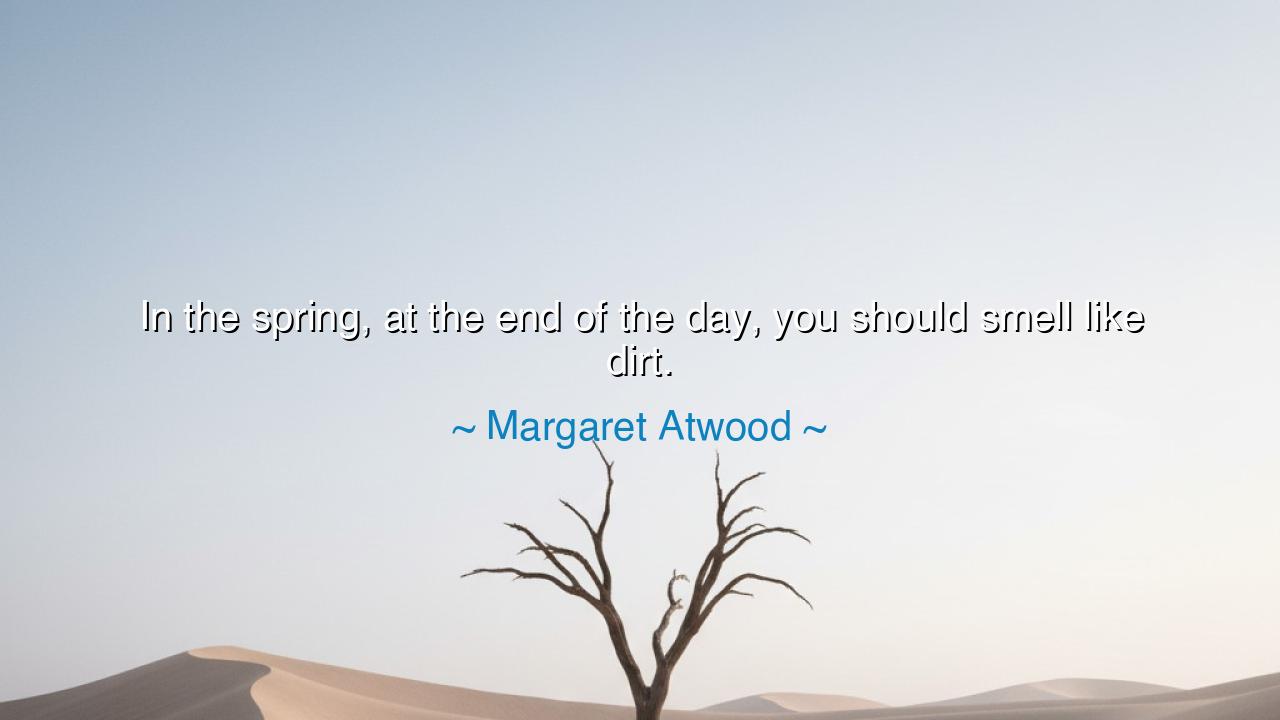
In the spring, at the end of the day, you should smell like dirt.






In the age-old dance of life, there exists a truth that has been whispered through the winds of time, carried by the ancestors who tilled the earth and sought sustenance from the very soil beneath their feet. It is a truth held in the sacred words of Margaret Atwood, a truth that echoes the timeless wisdom of those who knew that life itself is forged not in the comforts of passivity, but in the tilling of the earth, in the communion with the land, in the sweat and toil of one's labor. "In the spring, at the end of the day, you should smell like dirt."
Let us take a moment to contemplate these words, to allow their profound meaning to seep into our very souls. Spring—that season of renewal, of blossoming life—holds a special place in the heart of nature. It is the time when the earth stirs from her winter slumber, a time when every seed, every root, every sprout awakens to fulfill its sacred purpose. To smell like dirt at the end of this season, then, is no mere trifling matter. It speaks of a life lived in harmony with the earth, a life that works, a life that gives of itself, a life that leaves no stone unturned, no soil unplanted. It is the call of the land itself, urging us to embrace the dirt, to dive deep into the soil of our existence and feel the richness of what it means to be truly alive.
Consider the ancient farmers, whose hands were scarred and calloused by years of labor. They did not seek the comforts of a life untouched by the soil, for they knew the earth was their mother, their provider, their teacher. The late Agricola, a Roman who spent much of his life cultivating the land, was renowned not only for his wisdom but for his intimate knowledge of the dirt beneath his nails. His labor was not solely for personal gain; it was an offering to the divine rhythm of life. The dirt, he believed, was not simply the residue of a day's toil; it was a sacred medium through which the divine nourished both body and spirit. In his practice, there was no shame in being covered in the earth. Instead, it was a symbol of oneness with the land, a mark of respect for the life-giving soil that sustains all things.
The message of Atwood’s words is simple yet revolutionary. It tells us that life is not meant to be lived from the sidelines, nor in the safety of armchairs and idle comforts. Life demands action, it demands that we immerse ourselves in the very fabric of existence. Just as the farmers of old knew that no harvest would come without the labor of their hands in the soil, so too must we recognize that the fruits of life—whether they be wisdom, love, or achievement—are harvested through our dedication and commitment to the work that life requires.
History is full of examples of those who understood this principle well. Consider the story of Mahatma Gandhi, who, though a man of intellect and deep thought, never shied away from the physical labor of life. Gandhi's philosophy of simple living was not merely an abstract ideal; it was rooted in a life lived with purpose, a life in which one’s very being was intertwined with the land and its labor. When he took up the task of spinning khadi, the simple cotton fabric, it was not a frivolous pursuit. It was a conscious return to the land, a way to reconnect with the earth, to remind his people that true strength lay not in the mastery of foreign rulers, but in the mastery of their own labor. Through his hands, the earth and the people were healed, and in his efforts, the smell of the dirt became the fragrance of freedom.
This act, this humility in the face of the earth’s labor, speaks of the lesson that Atwood imparts. We must soil our hands. We must, in a figurative and literal sense, allow ourselves to become part of the land, to feel the earth’s pulse beneath our feet, to recognize that our work, like the work of the farmers and revolutionaries before us, is not a task but a calling. Each day of toil, each evening when we retire to rest with the scent of dirt on our hands and faces, is a day of honoring the work of life itself.
And so, let this wisdom guide you in your own journey. Do not fear the dirt. Do not shun the sweat of your brow. Embrace it. Plant your seeds—whether in the fields of work, love, or creativity—and nurture them with your hands, your energy, your spirit. There is no greater satisfaction than the knowledge that you have labored with love and with purpose. At the close of the day, when the world is settling into rest, let the fragrance of the earth, the dust of your efforts, linger on your skin. Let it be the sign of a life lived with honor, with grit, and with a deep connection to the world around you.
In the end, the true lesson is this: Life is not something to be observed from a distance, nor to be lived in isolation from the forces of nature. It is a call to action, to sweat, to soil, to labor, to become one with the earth that sustains you. Let every evening, at the close of the day, find you with hands in the soil, your heart filled with the fullness of work well done. And when you rest, let the scent of dirt be the reminder of a life fully lived.






AAdministratorAdministrator
Welcome, honored guests. Please leave a comment, we will respond soon